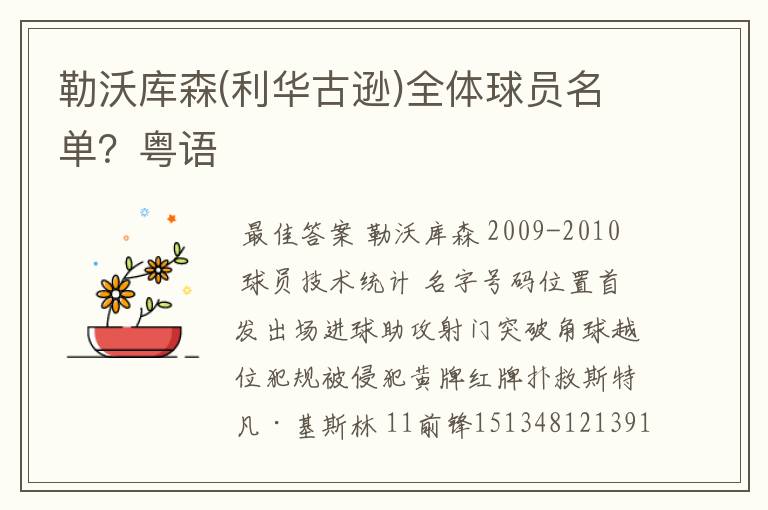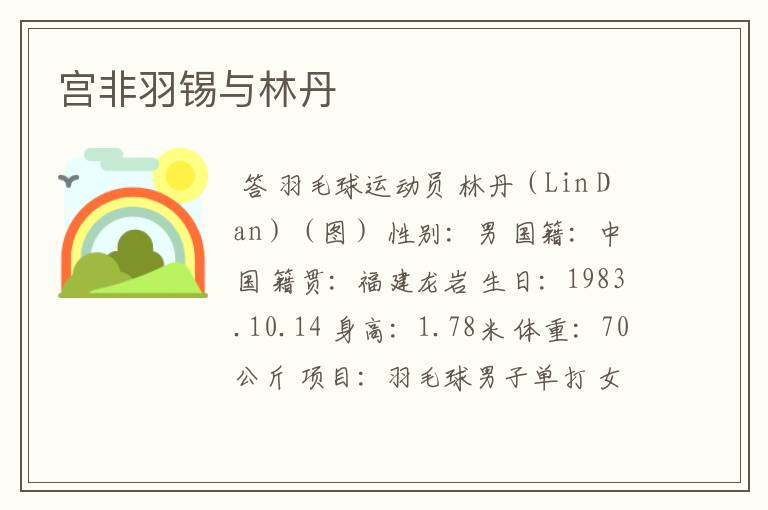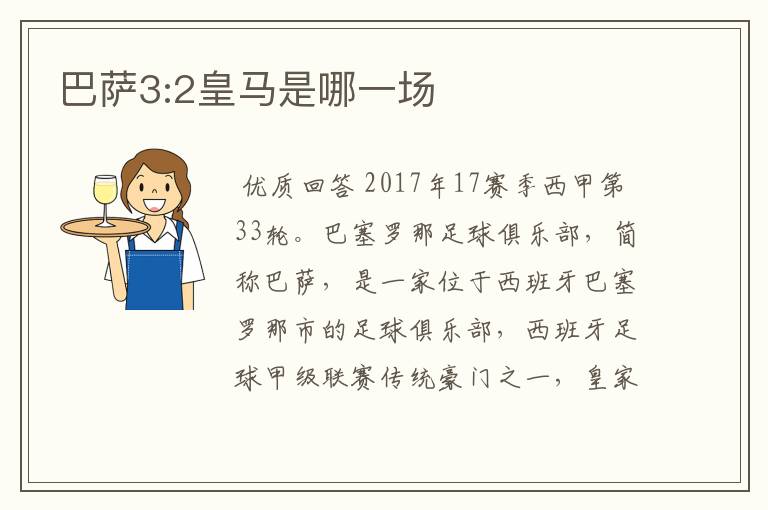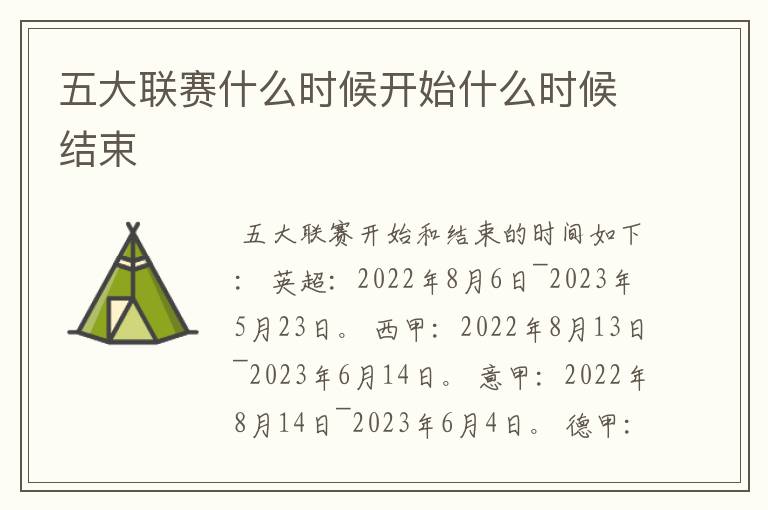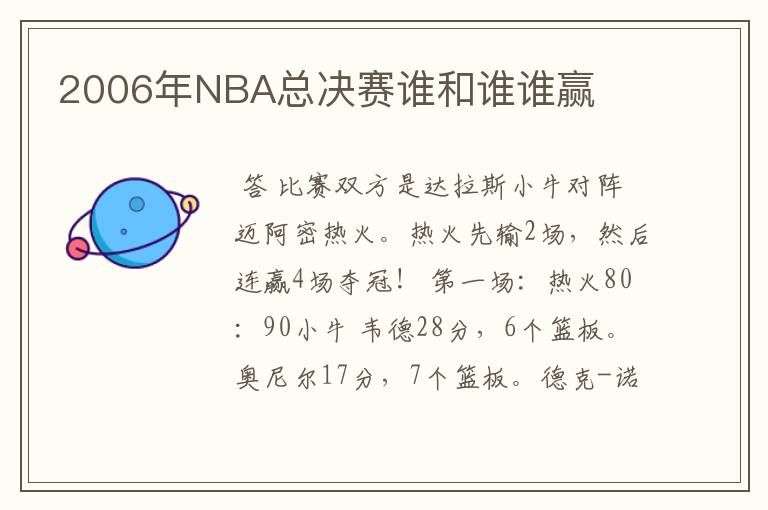德甲为什么只有拜仁是超级豪门?
今天运困体育就给我们广大朋友来聊聊拜仁在德甲有多厉害啊英文,希望能帮助到您找到想要的答案。
德甲为什么只有拜仁是超级豪门?
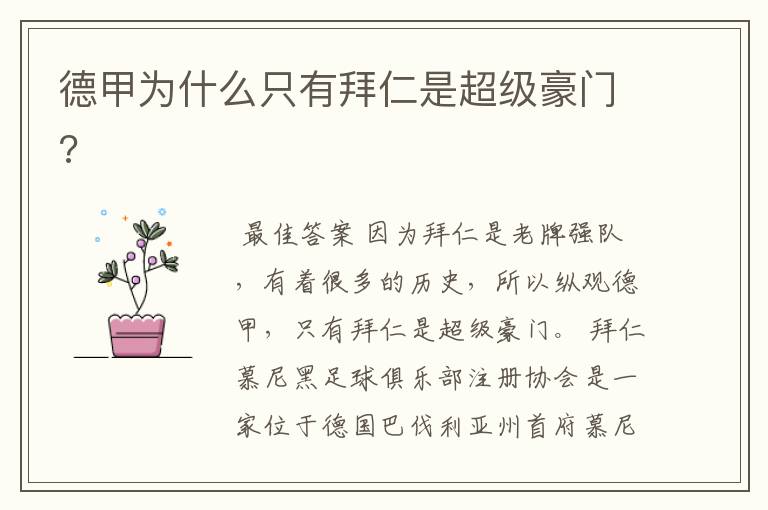
最佳答案因为拜仁是老牌强队,有着很多的历史,所以纵观德甲,只有拜仁是超级豪门。拜仁慕尼黑足球俱乐部注册协会是一家位于德国巴伐利亚州首府慕尼黑市的综合体育运动协会,成立于1900年2月27日,旗下最著名的是拜仁慕尼黑足球俱乐部。
1932年拜仁赢得了队史首次德国全国联赛冠军;1963年因德国足协不允许同城市有两队参加德甲,球队遗憾地未能成为德甲创始成员;1965/66赛季球队首次参加德甲,最终获得第三。
拜仁慕尼黑其他情况简介。
拜仁队徽由红白蓝三色组成,其中核心的蓝白格子源自于巴伐利亚州旗的颜色及样式;球队主场球衣主色调为红色及白色偶有蓝色。2005年拜仁告别了使用长达33年的慕尼黑奥林匹克体育场,入驻安联竞技场。拜仁慕尼黑足球俱乐部注册协会拥有近30万名官方正式会员,是世界上拥有会员数量最多的球迷协会。
拜仁慕尼黑作为德甲豪门,它的历史最佳阵容是怎样的?
最佳答案由于新冠肺炎疫情的影响,国际体坛几乎集体陷入了“停摆”的状态,尤其是以欧洲五大联赛和NBA为代表的职业联赛,使得球迷陷入了无球可看的境地。
在这样的情况下,还是来抚今追昔一下吧,盘点一下欧洲五大联赛一些豪门的“近30年最佳阵容”。事先声明,这是一家之言,肯定是非常的主观,欢迎各抒己见,如果纯粹是骂人就免了,。
对于德甲联赛来说,拜仁慕尼黑就是一个“无敌”的存在,在其他四大联赛,没有任何一个俱乐部可以像拜仁慕尼黑这样:能够挖联赛其他任何球队的球员,比如,有球迷就说多特蒙德都是“拜仁的后花园”。
只有当拜仁慕尼黑“打盹”的时候,德甲其他球队才能染指一下德甲联赛的冠军,因此,雷哈格尔带队创造的“凯泽斯劳滕奇迹”是多么的弥足珍贵。
守门员:卡恩
“狮王”无疑是拜仁慕尼黑在这个位置最佳的人选,他最大的特点就是又怒又威,有这样一位门将,是任何一支球队的幸福。
后防线:拉姆、马特乌斯、奥根塔勒、利扎拉祖。
拜仁慕尼黑在边路有两个闻名世界足坛的“小矮人”,别看他们的身材不出众,能力却是都能独当一面,拉姆、马特乌斯、奥根塔勒应该都做过德国队的队长,这说明了一切。
中场:施魏因施泰格、托马斯-穆勒、绍尔。
“小猪”是朴实无华的后腰,绍尔则被认为是最具有创造力的德国球员,至于托马斯-穆勒,他的很多进球有时连他自己都不知道是怎么进的……
锋线:罗本、里贝里、莱万多夫斯基。
“罗贝里”几乎就是一个整体,法国人的性格让他在拜仁慕尼黑如鱼得水,而如果不是时不时地受伤病的困扰,罗本也许会更加的无人能挡,至于莱万多夫斯基,他在德甲进球就是那么简单。
希斯菲尔德:成名于多特蒙德,成就于拜仁慕尼黑。
拜仁夺得德甲九连冠,他们的实力如何?
最佳答案拜仁的实力自不用多说,在德国联赛中属于一家独大的地步,在整个欧洲俱乐部中也属于顶级球队。拜仁慕尼黑队建队已经有121年的历史了,在这如此漫长的时间里,大多数时间都处于世界顶尖水平。拜仁不但自己的运营的十分成功,也为德国国家队输送了相当多的人才德国足球屹立在世界之巅。今天笔者就跟大家总结一下这支伟大的球队。
一、新千年之前的拜仁。
拜仁慕尼黑队成立于1900年,1910年加入了巴伐利亚地区联赛,1932年获得了第一个全国冠军。中间经历了战争的波折,直到1956年拜仁获得首个德国杯冠军,1965年正式进入加入德甲联赛,当年获得联赛季军,1967年获得欧洲优胜者杯冠军,1968年第一个德甲冠军,1973-1976拜仁获得欧冠三连冠。
二、新千年之后的拜仁愈加强悍。
2000年时,拜仁获得了第三个双冠王,并且从此创下了一系列令人叹为观止的记录,比如欧冠正赛主场16连胜,欧冠客场连续不败纪录18场,特别是2020赛季的六冠王,奠定了它的江湖地位。2020年拜仁先是提前三轮锁定德甲冠军,德国杯夺冠,欧冠夺冠,欧洲超级杯夺冠,德国超级杯夺冠,世俱杯夺冠。
三、培养出来无数的球星。
拜仁121年的历史上出了很多顶级球星。1970年代的“足球皇帝”贝肯鲍尔、“金色轰炸机”盖德穆勒、保罗布莱特纳等都是当年叱咤风云的球星。2000年代的卡恩,2010年代的拉姆、施魏因施泰格等球员都是球迷耳熟能详的巨星。
拜仁在全球都有许多忠实的拥趸,随着德国足球的复兴,拜仁的战绩也越来越好,相信会有更多的人会喜欢这支球队。
用英文简介一下拜仁
最佳答案Bayern Munich was founded in 1900 by members of a Munich gymnastics club. The club played its first games in the regional Bayern league. Bayern’s first success came in 1926 in the form of the championship of southern Germany, an achievement repeated two years later. Their first national honour was gained in 1932, winning the German championship by defeating Eintracht Frankfurt 2-0 in the final. The advent of the Hitler regime put an abrupt end to Bayern’s development. The president and the coach, both of whom were Jewish, left the country. Many others in the club also saw themselves purged. In the following years, Bayern, taunted as the “Jew’s club”, decayed into irrelevance.
After the war Bayern became a member of the southern conference of the German first division, which was split five ways at that time, the Oberliga Süd. Bayern struggled, and in 1956 suffered the ignominy of relegation. The following season the club returned to the Oberliga and even won the German Cup for the first time, beating Fortuna Düsseldorf 1-0 in the final. The club progressed to become one of the better sides of the league, but struggled financially, verging on bankruptcy at the end of the 1950s. Manufacturer Roland Endler provided the necessary funds and was rewarded with four years at the helm of the club. In 1963 the Oberligas in Germany were consolidated to one national league, the Bundesliga. Bayern were denied membership, but gained promotion two years later, fielding a team with young talents like Franz Beckenbauer, Gerd Müller and Sepp Maier - who would later be collectively referred to as the axis.
After the war Bayern became a member of the southern conference of the German first division, which was split five ways at that time, the Oberliga Süd. Bayern struggled, and in 1956 suffered the ignominy of relegation. The following season the club returned to the Oberliga and even won the German Cup for the first time, beating Fortuna Düsseldorf 1-0 in the final. The club progressed to become one of the better sides of the league, but struggled financially, verging on bankruptcy at the end of the 1950s. Manufacturer Roland Endler provided the necessary funds and was rewarded with four years at the helm of the club. In 1963 the Oberligas in Germany were consolidated to one national league, the Bundesliga. Bayern were denied membership, but gained promotion two years later, fielding a team with young talents like Franz Beckenbauer, Gerd Müller and Sepp Maier - who would later be collectively referred to as the axis.
1970 saw a new coach, Udo Lattek, taking charge. After winning the cup in his first season he led Bayern to their third German championship. The deciding match in the 1971-72 season against Schalke 04 was the first match in the brand new Olympic Stadium, and was also the first live televised match in Bundesliga history. Bayern swept Schalke away 5-1 and thus claimed the title, also setting several records, including points gained and goals scored. Bayern also won the next 2 championships, but the zenith was the triumph in the 1974 European Champions Cup final against Atlético Madrid, which Bayern won 4-0 after a replay. In the following season the team was unsuccessful domestically, but defended their European title by defeating Leeds United in the final when “Bull” Roth and Müller secured victory with their late goals. A year later in Glasgow, AS Saint-étienne were defeated by another Franz Roth goal and Bayern became the third club to win the trophy in 3 consecutive years. The final trophy won by Bayern in this era was the Intercontinental Cup, in which Brazilian club Cruzeiro Belo Horizonte were defeated over two legs.
The 1980s were a period of off-field turmoil for Bayern, with many changes in personnel and financial problems. On the field, the Bundesliga title was won in 1980 and 1981, but two trophyless seasons followed, after which former coach Udo Lattek returned. Bayern won the 1984 cup final, then went on to win 5 championships in 6 seasons, including a double in 1986. However, European success was elusive during the decade; Bayern only managed to claim the runners-up spot in the European Cup in 1982 and 1987. Bayern’s form dipped after their 1990 championship win, the club finishing just five points above the relegation places in 1991/92. Success returned when Franz Beckenbauer took over for the 2nd half of the 1993-94 season, winning the Championship again after a 3 year gap. Beckenbauer was then appointed club president, but his successors as coach did not meet expectations. During this time Bayern’s players frequently appeared in the gossip pages of the press rather than the sports pages, resulting in the nickname FC Hollywood. Franz Beckenbauer returned as coach, and led his team to victory in the 1996 UEFA Cup, beating Bordeaux in the final.
The 1980s were a period of off-field turmoil for Bayern, with many changes in personnel and financial problems. On the field, the Bundesliga title was won in 1980 and 1981, but two trophyless seasons followed, after which former coach Udo Lattek returned. Bayern won the 1984 cup final, then went on to win 5 championships in 6 seasons, including a double in 1986. However, European success was elusive during the decade; Bayern only managed to claim the runners-up spot in the European Cup in 1982 and 1987. Bayern’s form dipped after their 1990 championship win, the club finishing just five points above the relegation places in 1991/92. Success returned when Franz Beckenbauer took over for the 2nd half of the 1993-94 season, winning the Championship again after a 3 year gap. Beckenbauer was then appointed club president, but his successors as coach did not meet expectations. During this time Bayern’s players frequently appeared in the gossip pages of the press rather than the sports pages, resulting in the nickname FC Hollywood. Franz Beckenbauer returned as coach, and led his team to victory in the 1996 UEFA Cup, beating Bordeaux in the final.
Prior to the start of the 2005-06 season, Bayern moved from the Olympic Stadium to the new Allianz Arena, which the club shares with TSV 1860. In summer 2006 TSV 1860 Munich had to sell its party of the Allianz Arena to Bayern Munich due to a financial crisis. Bayern Munich now is the single owner of the Arena but both clubs hope that TSV 1860 Munich will repurchase its parts as soon as possible.
The current Bayern manager is Ottmar Hitzfeld, who returned to Munich in January 2007 after Felix Magath was sacked. In his first term at Bayern between 1998 and 2004 he won 4 Bundesliga titles, two DFB Pokals and the 2000-01 UEFA Champions League.
今天的内容先分享到这里了,读完本文《德甲为什么只有拜仁是超级豪门?》之后,是否是您想找的答案呢?想要了解更多,敬请关注www.zuqiumeng.cn,您的关注是给小编最大的鼓励。
本文来自网络,不代表本站立场,转载请注明出处:https://www.zuqiumeng.cn/wenda/632691.html
